|
|
|
Sort Order |
|
|
|
Items / Page
|
|
|
|
|
|
|
| Srl | Item |
| 1 |
ID:
139760
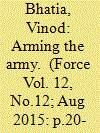

|
|
|
|
|
| Summary/Abstract |
Time magazine aptly summarised the operational performance and preparedness of the Indian Army during the 1962 conflict. That may not be true today for the armed forces, but may still hold good to a large extent for the Indian soldier and the infantry. Former army chief, General V.K. Singh, in a much publicised 12 March 2012 letter to the then Prime Minister, painted a grim picture of the operational capabilities of the 1.18-million-strong army. The critical voids highlighted in this letter included ammunition, artillery guns, obsolete air defence systems and above all a lack of adequate weapons for infantry and Special Forces battalions. A major concern expressed in the letter was, ‘large scale voids in essential weaponry as well as critical surveillance and night-fighting capabilities in the over 350 infantry and Special Forces’ battalions.’
|
|
|
|
|
|
|
|
|
|
|
|
|
|
|
|
| 2 |
ID:
141377
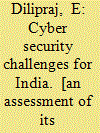

|
|
|
| 3 |
ID:
145380
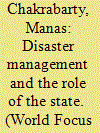

|
|
|
|
|
| Summary/Abstract |
Natural disasters hit at all in the society without any discrimination, rich and poor. But in reality, it is the poor who are the worst sufferers. One of the most important tasks before us is to introduce a culture of prevention in disaster managers and all communities at all levels. The culture must be disseminated so that all people in the society can become alert and become aware so that they can take some preventive measures in case of an emergency or before the disaster strikes. In this regard, early warning and conscious developmental planning are key elements to preventive planning regarding disaster. In India, now we experience a paradigm shift from post disaster response mechanism to pre disaster prevention, preparedness and mitigation strategy.
|
|
|
|
|
|
|
|
|
|
|
|
|
|
|
|
| 4 |
ID:
148745
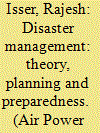

|
|
|
| 5 |
ID:
072809
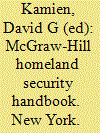

|
|
|
|
|
| Publication |
New York, McGraw-Hill, 2006.
|
| Description |
lii, 1196p.
|
| Standard Number |
0071446656
|
|
|
|
|
|
|
|
|
|
|
|
Copies: C:1/I:0,R:1,Q:0
Circulation
| Accession# | Call# | Current Location | Status | Policy | Location |
| 051527 | 363.320973/KAM 051527 | Main | On Shelf | Reference books | |
|
|
|
|
| 6 |
ID:
178185


|
|
|
|
|
| Summary/Abstract |
The article analyzes the Svalbard Global Seed Vault (SGSV) as a specific security technology created to deal with the ecological threat of biodiversity loss. Built in 2008 inside the Arctic Circle, the SGSV serves as a backup for 1,700 agricultural gene banks around the world. If seed collections are lost due to natural disasters or human error, the gene banks can request copies of their varieties from Svalbard and restore their collections to continue the endeavour of plant breeding. The article focuses on the particular temporal politics expressed in the SGSV. Drawing on Niklas Luhmann’s reflections on time, it is argued that the SGSV opens up the possibility of reversing events by expanding the duration of the present. By separating seeds from their ecological connections on the one hand and controlling their metabolic processes through the use of cold on the other, an enduring temporal zone is created that allows modern society to control the unpredictable and irreversible dynamics of life and undo its emergent effects. The SGSV therefore materializes what is herein called the politics of reversibility.
|
|
|
|
|
|
|
|
|
|
|
|
|
|
|
|
| 7 |
ID:
114568
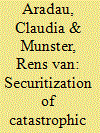

|
|
|
|
|
| Publication |
2012.
|
| Summary/Abstract |
Psychological knowledge has become incorporated into a range of security practices, discourses, and interventions in catastrophic events, including terrorism. By engaging the existing literature on the medicalization and psychologization of security, this article reads the enactment knowledge deployed in preparedness exercises from the perspective of psychodrama and sociodrama rather than that of psychoanalysis or psychosocial risk management. Enactment has become an important mode of knowledge for the governance of terrorism, as preparedness exercises deploy action methods, drama, enactment, and performance to prepare for unexpected, catastrophic events. Taking seriously the conceptualization of enactment, as deployed in psychodrama and sociodrama, can also challenge the securitization of catastrophic events. The article concludes that enactment, which foregrounds action rather than speech, and suggests that meaning follows action, can also offer critical insights into securitization theory.
|
|
|
|
|
|
|
|
|
|
|
|
|
|
|
|
| 8 |
ID:
165018
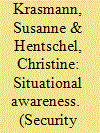

|
|
|
|
|
| Summary/Abstract |
The emergence of ‘situational awareness’ as a response to the perception of a new terrorism in European cities marks a significant shift in the conceptualization of security. Focusing on a recently introduced German Federal Police programme that trains ordinary officers in their capability to handle ‘complex life-threatening situations of police operation’, the article explores how situational awareness introduces a warrior logic into policing and urban subjectivity and modifies our understanding of security at large. It points us to the limitations of preparedness and concretizes the hitherto elusive call to resilience. Three analytical dimensions – space–time, sensing and connectivity – will be developed to render the situation thinkable for empirical research as well as to grasp security as a ‘live’ mode of government.
|
|
|
|
|
|
|
|
|
|
|
|
|
|
|
|
|
|
|
|
|